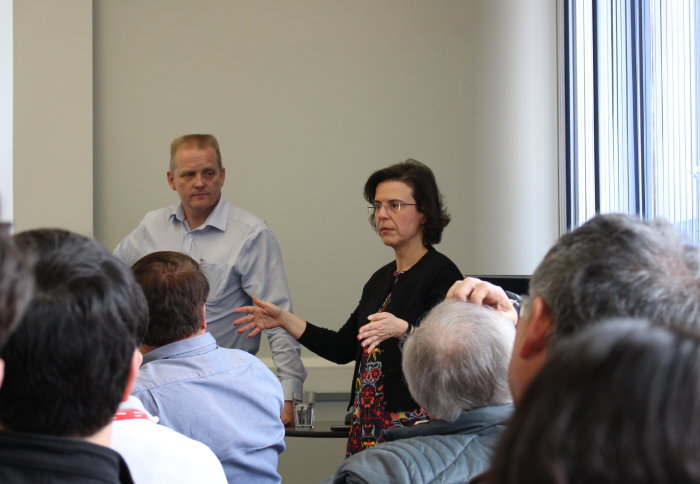Sustainability across scales: from supply chain to molecules

Professor Tom Welton and Professor Anna Korre
The Institute for Molecular Science and Engineering (IMSE) held their inaugural Lunchtime Seminar of 2018 last week, on the topic of green chemistry.
Professor Anna Korre (Professor of Environmental Engineering, Department of Earth Science and Engineering) and Professor Tom Welton (Professor of Sustainable Chemistry, Department of Chemistry and Dean of the Faculty of Natural Sciences) presented two interesting perspectives on the theme of sustainable chemistry during the Lunchtime Seminar.
Community building
Today’s seminar – bringing together a range of expertise in molecular science – is a perfect example of IMSE’s role as an Imperial Global Institute. Professor Nic Harrison IMSE Co-Director
Held in the relaxed environment of the IMSE Master’s of Research teaching and cohort space, the Institute’s Lunchtime Seminar Series is an ideal opportunity for Imperial staff and students to learn about an active topic of ongoing research, and to engage with the growing molecular science and engineering community in College.
Towards sustainable development
The topic of green – sustainable – chemistry directly relates to some of the most pressing challenges faced in the modern world. For example, Professor Korre’s work addresses several of UNESCO’s 17 Sustainable Development Goals, including clean water, affordable and clean energy, industry, innovation and infrastructure, sustainable cities and communities, responsible consumption and production, and climate action.

The focus of some of Professor Korre’s work is to assess the environmental and human health risks that arise from the extraction of natural resources. This addresses challenges that are faced in the minerals, energy and water sectors.
In a recent collaboration with the EPSRC Centre for Computational Chemistry, her group used a combination of scientific understanding and advanced modelling techniques to assess the fate – in the atmosphere – of chemicals that are used during carbon-capture activities, i.e., capture of carbon dioxide (from coal-based power generation, in this case).
It is our job as researchers to produce independent evidence for governments and companies, so that they are driven to reduce their emissions. Professor Anna Korre Department of Earth Science and Engineering
By developing and employing their own comprehensive, and flexible life-cycle analysis tools, Professor Korre and her colleagues can provide emission estimates that are tailored to the value chains being considered and that are more accurate than current commercial tools. Industry and government organisations can therefore confidently predict their emissions profiles. They can also select appropriate emission-reduction options, by considering both environmental performance and associated costs.
The solvent problem
In the second half of the seminar, Professor Welton turned the focus to the molecular scale and to the sustainability problems that solvents present.
There is not going to be a consumer-led green revolution – chemistry needs to be both commercially sustainable and green. Professor Tom Welton Dean of the Faculty of Natural Sciences
He explained why solvents are so problematic – “they’re used everywhere” – and how the solvent paradigm has evolved over the past few decades. Although, in the past, certain solvents were seen as ‘green’, this view was “slightly naïve”. Instead, the modern prevailing view is that processes involving solvents can be made to be more – or less – sustainable.
Professor Welton also emphasised the need for chemical processes to be sustainable in both an environmental and an economic sense.
As an example, he described how the process for coffee decaffeination has changed. Originally, an environmentally undesirable solvent (dichloromethane) was used, but this produced unpopular coffee with a poor taste. Nowadays, a ‘greener’ solvent (supercritical carbon dioxide) is used and the flavour of the resultant decaffeinated coffee is much improved and more favourable to consumers.

Moreover, the process of decaffeination has given rise to a whole new line of products. Instead of discarding the ‘waste’ caffeine, the food industry now uses it to produce energy drinks (such as Red Bull) that never existed previously. Modern coffee decaffeination has therefore become more environmentally friendly and commercially sustainable.
Upcoming IMSE Seminars
 The IMSE Lunchtime Seminar Series will continue on Thursday 24 May at 12.00, with talks from Professor Jason Riley (Department of Materials) and Dr Billy Wu (Dyson School of Design Engineering) on Upscaling energy storage technologies: from material science to pack engineering.
The IMSE Lunchtime Seminar Series will continue on Thursday 24 May at 12.00, with talks from Professor Jason Riley (Department of Materials) and Dr Billy Wu (Dyson School of Design Engineering) on Upscaling energy storage technologies: from material science to pack engineering.
IMSE will also host Professor Frances Arnold (Caltech) to deliver their next Highlight Seminar– Innovation by evolution: bring new chemistry to life– on Monday 21 May at 14.00. Please register (free) for the event here.
Article text (excluding photos or graphics) © Imperial College London.
Photos and graphics subject to third party copyright used with permission or © Imperial College London.
Reporter
Dr Shoshana Z Weider
Faculty of Engineering